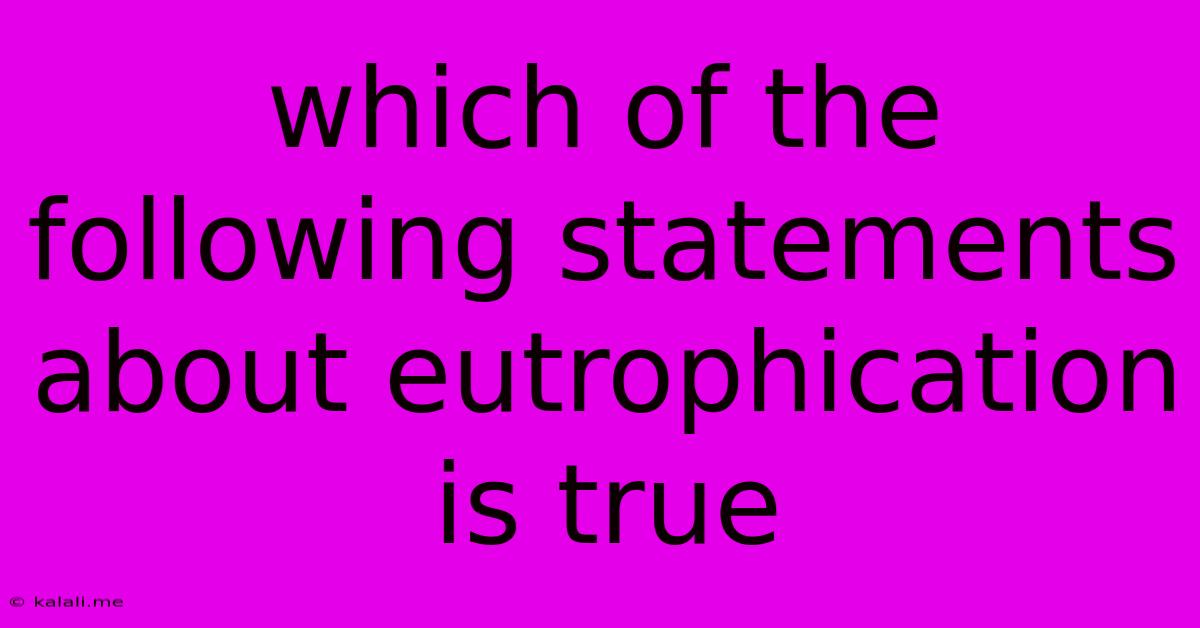Which Of The Following Statements About Eutrophication Is True
Kalali
Jun 13, 2025 · 2 min read

Table of Contents
Which of the Following Statements About Eutrophication is True? Understanding the Impacts of Nutrient Pollution
Eutrophication, a process fueled by excessive nutrient runoff, is a significant environmental concern impacting water bodies globally. Understanding what constitutes a true statement about eutrophication is crucial to grasping its devastating effects and implementing effective mitigation strategies. This article explores several common statements about eutrophication, clarifying which are accurate and explaining the underlying science.
What is Eutrophication? Before delving into the true statements, let's briefly define eutrophication. It's the excessive enrichment of water bodies with nutrients, primarily nitrogen and phosphorus, leading to a series of ecological changes. This nutrient overload stimulates excessive plant and algae growth (algal blooms), depleting oxygen levels and harming aquatic life. This process significantly alters the water quality and ecosystem health, causing widespread damage.
Evaluating Statements About Eutrophication: Now, let's analyze common statements about eutrophication and determine their accuracy:
Statement 1: Eutrophication is always caused by human activities.
FALSE. While human activities are a major contributor to eutrophication (e.g., agricultural runoff, sewage discharge, industrial waste), natural processes can also cause it. Natural eutrophication occurs slowly over geological timescales, but accelerated eutrophication is primarily due to anthropogenic (human-caused) factors.
Statement 2: Eutrophication leads to increased oxygen levels in water bodies.
FALSE. Quite the opposite. The decaying organic matter from excessive algal blooms consumes large amounts of dissolved oxygen, creating hypoxic (low-oxygen) or anoxic (no-oxygen) conditions, leading to “dead zones” where aquatic life cannot survive. This oxygen depletion is a hallmark of eutrophication.
Statement 3: Algal blooms are a key indicator of eutrophication.
TRUE. Algal blooms are a visible and significant symptom of eutrophication. The abundance of nutrients fuels rapid growth of algae, leading to these blooms. These blooms can be harmful, producing toxins, blocking sunlight, and ultimately contributing to oxygen depletion.
Statement 4: Eutrophication primarily affects freshwater ecosystems.
FALSE. While eutrophication is a severe problem in freshwater lakes and rivers, it also impacts marine and coastal ecosystems. Nutrient runoff from land ultimately flows into oceans, causing similar harmful effects in coastal areas. Examples include harmful algal blooms (HABs) in coastal waters and the formation of dead zones in estuaries and oceans.
Statement 5: Reducing nutrient runoff is a key strategy for mitigating eutrophication.
TRUE. Addressing the root cause of eutrophication – excessive nutrient input – is crucial. Strategies include improving agricultural practices (reducing fertilizer use, implementing buffer strips), upgrading wastewater treatment plants, and controlling industrial discharges. These measures can effectively reduce nutrient runoff and alleviate the impacts of eutrophication.
Conclusion: Understanding the intricacies of eutrophication is critical for effective environmental management. While natural processes can contribute, human activities are the primary drivers of the accelerated eutrophication observed globally. By recognizing the true statements and understanding the consequences, we can implement appropriate measures to protect our valuable water resources and preserve aquatic ecosystems for future generations. The focus on reducing nutrient runoff remains the most effective strategy to combat this widespread environmental problem.
Latest Posts
Latest Posts
-
How Many Days Are In Ten Months
Jul 01, 2025
-
How Many Cups Are In 29 Oz
Jul 01, 2025
-
How Many Fluid Ounces In A Half Gallon
Jul 01, 2025
-
How Many Chicken Thighs In A Pound
Jul 01, 2025
-
How Old Is Someone Born In 1992
Jul 01, 2025
Related Post
Thank you for visiting our website which covers about Which Of The Following Statements About Eutrophication Is True . We hope the information provided has been useful to you. Feel free to contact us if you have any questions or need further assistance. See you next time and don't miss to bookmark.